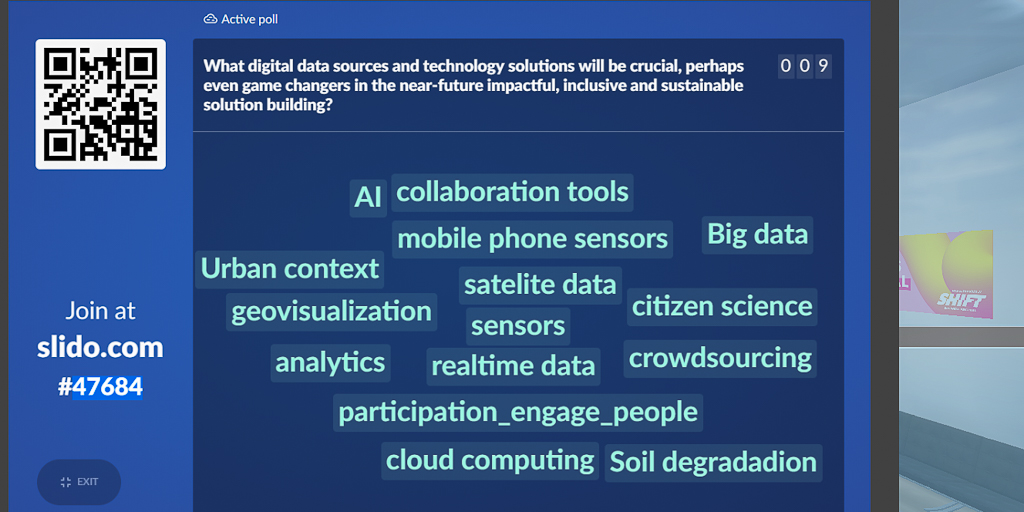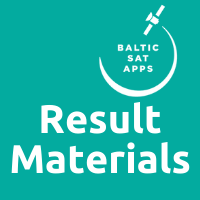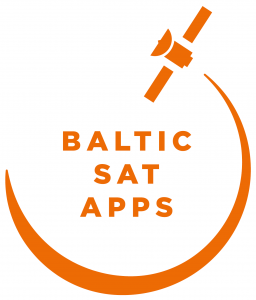BalticSatApps Final Event at SHIFT 2020 Business Webstival
About SHIFT 2020 Business Webstival
The SHIFT Business Festival was launched successfully in 2016, and has been organised in Turku, Finland since. In addition to startup companies, the event has been targeted to decision-makers and tech innovators. The focus has been in intelligent business that is sustainable and profitable, and able to adopt new technologies when they’re relevant to the business. The Covid-19 pandemic affected profoundly the organising of the event this year. From the different variations and postponed event timing, all the festival programme was turned virtual and finally organised on 27–28 October. This meant that the knowledge sharing and networking was to happen with help of the VirBELA software, and the event was built in an immersive virtual world.
The delayed timing of the SHIFT Business Festival in 2020 matched with the plans of the BalticSatApps project’s final event that was to be held in Turku in Autumn 2020. As a result, the project managed a virtual booth on 27–28 October, and a virtual workshop on 27 October to share the project achievements and promote satellite data based solutions. It was possible to participate in those events by buying a virtual festival pass.
Remarks from the BalticSatApps Booth on 27–28 October

The BalticSatApps Virtual Booth was located at the Expo Hall, and was open on 27–28 October. The booth was equipped with four interactive information screens and two table groups. At the tables, it was possible to have private conversations between the visitors and the BalticSatApps experts. Conversations inside the blue area were not available for persons outside it. In addition to live talk option, it was possible to chat with other participants and write messages to them. It was also possible to follow the programme, do matchmaking and communicate with other participants with the help of a separate Talque application.
- At the Startup Corner, it was possible to get to know some of the EO startups that have been established with the help of BalticSatApps activities.
- The key activities and results of the BalticSatApps project were presented on the screens: Accessing and using Earth Observation data (user uptake), Promoting innovations in EO-based services, and Commercialisation of EO-based innovations (business development).
- There were BalticSatApps partners’ personnel available for queries and discussions, which resulted also in new collaborations during the two days.
- There were at most approximately a hundred persons active at the Expo Hall at the time, and the booths there were not too busy most of the time.
Remarks from “Satellite Data for a Sustainable Future” Workshop on 27 October
The workshop “Satelllite data for a sustainable future” collected some twenty listeners at the VirBELA virtual world within the SHIFT 2020 on 27 October. Olga Bodet, CEO of Zero Gravity, opened the workshop by telling about their solutions for combining Earth Observation technologies with comprehensive analytic dashboard visualization to provide a full picture of urban, environmental, and mobility states of cities, in the form of a “digital twin”.

The workshop continued with an open discussion and interactive questions, moderated by Niina Käyhkö, Associate Professor at the University of Turku, and Timo Huttunen, Network Manager at Turku Science Park Ltd. The discussion started with the question of how to develop sustainable and innovative EO data solutions. Attendees mentioned as key issues the import role of software developers in the development process, and having development teams commence collaboration with potential clients already at the early stages of service development.

The workshop attendees were then asked to consider what digital data sources and technology solutions they see as crucial in impactful, inclusive and sustainable solution building. The workshop attendees proposed issues, such as Artificial Intelligence, collaboration tools, sensors (e.g. in mobile phones), Big Data, satellite data, realtime data, geovisualisation, urban context, soil degradation, citizen science, crowd-sourcing, analytics, participation and engagement of people, and cloud computing.
The workshop was concluded by Project Manager Tuomas Ranti from the University of Turku who presented the results of the BalticSatApps project. During the three years, over 300 different companies have participated in BalticSatApps events out of their own interest in hearing more about the opportunities provided by EO and Copernicus. Through its events, BalticSatApps has also reached a large crowd of developers that have been provided with information and hands-on support on how to develop EO applications. As a prime result of these activities, a number of new EO startups have been established in the BalticSatApps partner countries.
Conclusions of the SHIFT 2020 virtual event as the BalticSatApps final event
What worked well:
- The VirBELA and Talque applications worked technically and visually well, it was also fun as an experience.
- Personalised avatars. Moving and communicating with the avatar was effortless.
- It was possible to follow the diverse programme easily in various locations (Future and Solution Stages’ presentations, Expo Hall, different co-working areas etc.) thanks to being able to switch your location quickly.
- Entrance ticket to the virtual event was cheaper than what it would have been to the live event.
- No physical travel was needed, which saved a lot of time and ensured the safety of the participants.
- The BalticSatApps crew from the different countries had also numerous interesting discussions with each other during the events – the feeling was almost as if we had met physically.
Learnings and things to improve:
- The time given to prepare for the virtual event was quite short, and it was difficult to plan in advance the concept at the booth and at the workshop without advance knowledge of an all-virtual mass event, and how it is going to look and work (administrative persons were able to enter the virtual environment a couple of days before the events, and manage workshop practicalities only one day before the event).
- More visitors at the Expo Hall and at the workshop would have been anticipated. It could have been planned so that all the SHIFT 2020 participants had needed to go through the Expo Hall when entering the virtual event environment. Now, participants needed to separately decide to go there (through a shortcut or by having their avatar walk there). The Expo Hall area was also a bit difficult to find by walking.
- It would be nice if it were possible to give out compact online “flyers” that would be easy to share at the booth and at the workshop to the participants.
- It was not all the time clear for the participants, how widely heard and public their conversation would be.
- The experience showed that having thematic short presentations at the booth is a good way to increase visitor engagement and participation at the expo area section of the event. It was also possible to advertise your booth by sticking “post-it notes” to the walls of the public areas of the event.
- The business audience focus of the event, and the fact that the event could not be attended free of charge limited to some extent the participation of the various BalticSatApps’ target groups and stakeholders.
- The costs of renting the booth and workshop were relatively high.
All in all, It was a fascinating and valuable experience to get to try out an all-virtual mass event, and the BalticSatApps crew received much information about the practicalities and possibilities of such an event for the next time. One-to-one meetings and other interaction that took place at the event, the booth and the workshop worked well and resulted in new openings. The booth and the workshop were surprisingly comparable to a physical booth and workshop in a physical event. However, the main focus was even more than normally on person-to-person discussions, and not as much on information displayed or brochures distributed as in similar physical events.


